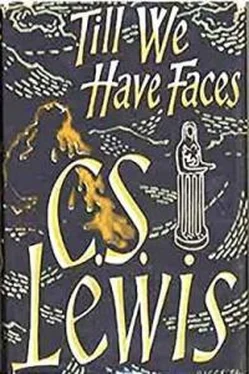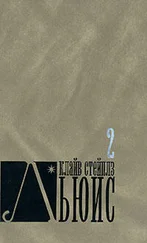Jealousy! I jealous of Psyche? I sickened not only at the vileness of the lie but at its flatness. It seemed as if the gods had minds just like the lowest of the people. What came easiest to them, what seemed the likeliest and simplest reason to put in a story, was the dull, narrow passion of the beggars’ streets, the temple brothels, the slave, the child, the dog. Could they not lie, if lie they must, better than that?
“…and wanders over the earth, weeping, weeping, always weeping.” How long had the old man been going on? That one word rang in my ears as if he had repeated it a thousand times. I set my teeth and my soul stood on guard. A moment more and I should have begun to hear the sound myself again. She would have been weeping in that little wood outside the temple door.
“That’s enough,” I shouted. “Do you think I don’t know a girl cries when her heart breaks? Go on, go on.”
“Wanders, weeping, weeping, always weeping,” he said. “And falls under the power of Talapal, who hates her. And of course Ialim can’t protect her because Talapal is his mother and he’s afraid of her. So Talapal torments Istra and sets her to all manner of hard labours, things that seem impossible. But when Istra has done them all, then at last Talapal releases her, and she is reunited to Ialim and becomes a goddess. Then we take off her black veil, and I change my black robe for a white one, and we offer——”
“You mean she will some day be reunited to the god; and you will take off her veil then? When is this to happen?”
“We take off the veil and I change my robe in the spring.”
“Do you think I care what you do? Has the thing itself happened yet or not? Is Istra now wandering over the earth or has she already become a goddess?”
“But, Stranger, the sacred story is about the sacred things; the things we do in the temple. In spring, and all summer, she is a goddess. Then when harvest comes we bring a lamp into the temple in the night and the god flies away. Then we veil her. And all winter she is wandering and suffering; weeping, always weeping….”
He knew nothing. The story and the worship were all one in his mind. He could not understand what I was asking.
“I’ve heard your story told otherwise, old man,” said I. “I think the sister—or the sisters—might have more to say for themselves than you know.”
“You may be sure that they would have plenty to say for themselves,” he replied. “The jealous always have. Why, my own wife now——”
I saluted him and went out of that cold place into the warmth of the wood. I could see through the trees the red light of the fire my people had already kindled. The sun had set.
I hid all the things I was feeling—and indeed I did not know what they were, except that all the peace of that autumnal journey was shattered—so as not to spoil the pleasure of my people. Next day I understood more clearly. I could never be at peace again till I had written my charge against the gods. It burned me from within. It quickened; I was with book, as a woman is with child.
And so it comes about that I can tell nothing of our journey back to Glome. There were seven or eight days of it, and we passed many notable places in Essur; and in Glome, after we had crossed the border, we saw everywhere such good peace and plenty and such duty and, I think, love towards myself as ought to have gladdened me. But my eyes and ears were shut up. All day, and often all night too, I was recalling every passage of the true story, dragging up terrors, humiliations, struggles, and anguish that I had not thought of for years, letting Orual wake and speak, digging her almost out of a grave, out of the walled well. The more I remembered, the more still I could remember; often weeping beneath my veil as if I had never been Queen, yet never in so much sorrow that my burning indignation did not rise above it. I was in haste too. I must write it all quickly before the gods found some way to silence me. Whenever, towards evening, Ilerdia pointed and said, “There, Queen, would be a good place for the tents,” I said (before I had thought what I would say), “No, no. We can make three more miles tonight; or five.” Every morning I woke earlier. At first I endured the waiting; fretting myself in the cold mist, listening to the deep–breathed sleep of those young sleepers. But soon my patience would serve me no longer. I took to waking them. I woke them earlier each morning. In the end we were travelling like those who fly from a victorious enemy. I became silent, and this struck the others silent too. I could see they were bewildered and all the comfort of their travels was gone. I suppose they whispered together about the Queen’s moods.
When I reached home, even then I could not set about it so suddenly as I had hoped. All manner of petty work had piled up. And now, when I most needed help, word was sent me that Bardia was a little sick and kept his bed. I asked Arnom about Bardia’s sickness, and Arnom said, “It’s neither poison nor fever, Queen; a small matter for a strong man. But he’d best not rise. He’s ageing, you know.” It would have given me a thrust of fear but that I already knew (and had seen growing signs of it lately) how that wife of his cockered and cosseted him, like a hen with one chicken; not, I’d swear, through any true fears, but to keep him at home and away from the palace.
Yet at last, after infinite hindrances, I made my book and here it stands. Now, you who read, judge between the gods and me. They gave me nothing in the world to love but Psyche and then took her from me. But that was not enough. They then brought me to her at such a place and time that it hung on my word whether she should continue in bliss or be cast out into misery. They would not tell me whether she was the bride of a god, or mad, or a brute’s or villain’s spoil. They would give no clear sign, though I begged for it. I had to guess. And because I guessed wrong they punished me; what’s worse, punished me through her. And even that was not enough; they have now sent out a lying story in which I was given no riddle to guess, but knew and saw that she was the god’s bride, and of my own will destroyed her, and that for jealousy. As if I were another Redival. I say the gods deal very unrightly with us. For they will neither (which would be best of all) go away and leave us to live our own short days to ourselves, nor will they show themselves openly and tell us what they would have us do. For that too would be endurable. But to hint and hover, to draw near us in dreams and oracles, or in a waking vision that vanishes as soon as seen, to be dead silent when we question them and then glide back and whisper (words we cannot understand) in our ears when we most wish to be free of them, and to show to one what they hide from another; what is all this but cat–and–mouse play, blindman’s buff, and mere jugglery? Why must holy places be dark places?
I say, therefore, that there is no creature (toad, scorpion, or serpent) so noxious to man as the gods. Let them answer my charge if they can. It may well be that, instead of answering, they’ll strike me mad or leprous or turn me into beast, bird, or tree. But will not all the world then know (and the gods will know it knows) that this is because they have no answer?
Not many days have passed since I wrote those words No answer , but I must unroll my book again. It would be better to re–write it from the beginning, but I think there’s no time for that. Weakness comes on me fast, and Arnom shakes his head and tells me I must rest. They think I don’t know they have sent a message to Daaran.
Since I cannot mend the book, I must add to it. To leave it as it was would be to die perjured; I know so much more than I did about the woman who wrote it. What began the change was the very writing itself. Let no one lightly set about such a work. Memory, once waked, will play the tyrant. I found I must set down (for I was speaking as before judges and must not lie) passions and thoughts of my own which I had clean forgotten. The past which I wrote down was not the past that I thought I had (all these years) been remembering. I did not, even when I had finished the book, see clearly many things that I see now. The change which the writing wrought in me (and of which I did not write) was only a beginning; only to prepare me for the gods’ surgery. They used my own pen to probe my wound.
Читать дальше











